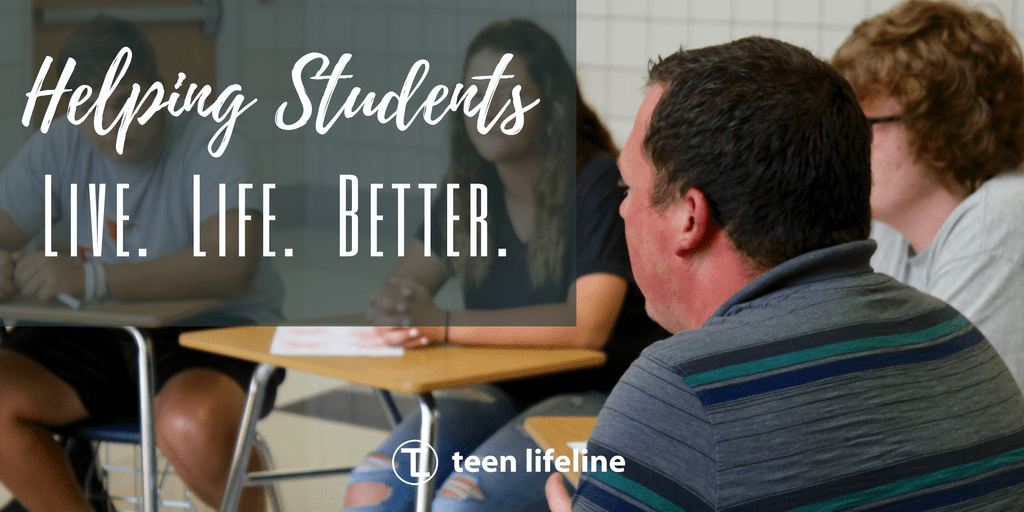
by Chris Robey | Sep 1, 2016 | Mental Health
A few months back, our team at Teen Lifeline took an assessment that looked at our motivations. Many assessments focus on personality, but I loved this one because it looked past our tendencies and helped us understand what drives us to succeed – and why we get frustrated in our pursuits.
This assessment really pegged me. There were a few key motivations that came to light but one really caught my eye.
Improve.
As I work, interact, and even play – I’m always looking to improve in some way.
I don’t feel like it’s an obsessive trait, but it is definitely something that motivates – and frustrates if the opportunity to improve is lacking.
I think back to some of my past jobs where I experienced a lot of frustration. Usually it wasn’t the job. It was the lack of opportunity to make things better.
This is why I love my job now. At Teen Lifeline, I am called to not only create, maintain, and evaluate our programs, but I get to call adults into the public schools to help teenagers do the same. Our support groups give students the opportunity to improve their lives through small changes that can make a huge impact.
In our support groups, teenagers from every walk of life, faith, and background are welcomed into a support group to find community and acceptance in a way that is totally new for many of our students. They get to take a few small minutes each week to reflect on where life has taken them to this point, but more importantly – how they can move forward and make things better.
Our students need more adults with empathetic ears who will sit and listen – and not correct. Our groups provide an avenue for this to happen.
So why am I writing about our groups this week? Today is the official kick off of our 2016-17 support groups! We are thrilled to engage our local students across multiple school districts around our area and to provide more and more opportunities for students to live life better.
We are so excited to do this. We are thrilled to help improve the students we serve, the adults who serve them, and ourselves in the process.
Have you considered leading a support group at a public school? You can. Go to this link to find out more!
Chris Robey, Teen Lifeline’s Program Director, has worked with teens for over a decade and strives to help students see the best in themselves.

by Karlie Duke | Aug 27, 2015 | Parenting
I love this time of year, the time when crayons are on sale and my newsfeed is filled with pictures of forced-smiling students in backpacks. Every year when August rolls around, I like to drag out my old pictures and reflect back on all of my FDOS (First Days of School).
 I think back to when I was in Kindergarten and was so excited to be in “big kid school” with my new backpack and friends, but promptly fell asleep as soon as I got home due to all that excitement.
I think back to when I was in Kindergarten and was so excited to be in “big kid school” with my new backpack and friends, but promptly fell asleep as soon as I got home due to all that excitement.
I will probably never forget my first day of Middle School…the nerves and anxiety of wondering if I would remember my locker combination, who I would sit by at lunch, and if I would survive the mature and much cooler 8th graders. I do look back on this day with super warm fuzzys.
I definitely remember my first day of Senior year! This year came with few nerves and doubts. By this time, I knew what to expect and where I stood, this FDOS was all excitement, anticipation and hope.
 If we are being honest, as many FDOS as I had in elementary, middle and high school, it is that first day (and week) of college that sticks out the most to me. Just like in kindergarten, I had a new backpack, new friends and a brand new environment. I was missing home but was nervous-excited for what the next four years would bring. However, more than anything else, I felt prepared; I knew that all the other “Firsts” were leading up to this big one.
If we are being honest, as many FDOS as I had in elementary, middle and high school, it is that first day (and week) of college that sticks out the most to me. Just like in kindergarten, I had a new backpack, new friends and a brand new environment. I was missing home but was nervous-excited for what the next four years would bring. However, more than anything else, I felt prepared; I knew that all the other “Firsts” were leading up to this big one.
As the first day of school comes and goes each, whether you have a baby at home, just walked your kindergartener into their first class or dropped you college student off in a strange town, your goal is for them to make it to that “Last First Day.” While parenting your children with the end in mind (hopefully that they will grow up, move on and have families of their own), there are several things you can do to prepare them for the inevitable – the leaving part.
1. Encourage and equip at every stage.
Don’t force your child to grow up too fast, but don’t ever ask, “Do you really think you are ready for this?” Instill confidence in your kids from the time they step into elementary school to their last day of college. If they feel prepared and that you are cheering them on at every step, that transition is so much easier!
2. Slowly release the reigns.
Kids need boundaries, especially the teenager-types! However, they also need to begin to explore and regulate their own boundaries before they are completely on their own. When they first get their car, make their curfew a little stricter than necessary so you can relax as they approach their senior year. Give more responsibilities, show more trust and pry less as they get older. This not only shows that you trust them, but also gives them the opportunity to excel (or fail) for the first in your home and not when they are living in a dorm room 1,000 miles away.
3. Ask about their hopes and dreams.
Ask them about their future, where they hope to be in college, after college and beyond. By doing this, you are forcing them to think about their goals and what it will take to get there. I have yet to meet a teenager without a dream for their future, but this future can seem far away for the 6th grader who just wants to be popular or the junior in high school who can’t seem to pass Physics. Give them motivation now and the expectation that, one day, they will have their own plans outside of you and your home.
4. Tell them about your hopes and dreams.
Let them know what dreams you have for their future! When you were holding your newborn for the first time, you were probably not dreaming that he would find great friends, date the perfect girl and finish high school only to live in your basement for the rest of his life. You might have had grand dreams of college, a great career, a loving family and grandbabies. Remind them (and yourself) that you want them to leave. You want them to be mature and responsible enough to be on their own and function as a (somewhat normal) human being.
5. Prepare yourself.
The greatest way to prepare your kids to graduate, grow up and move out on their own is to prepare yourself. Take pictures, cry as they drive themselves to school for the first time, force them to participate in family game nights, but don’t lose sight of the dreams and goals we just talked about. Parent with the end in mind, knowing that they will leave and that is good. Instead of making them feel guilty for leaving you, send them off with the confidence and trust that they will excel because they are prepared.
Karlie Duke was in one of Teen Lifeline’s original support groups and now is our Communications Director. She is passionate about speaking life into students and encouraging them to live better stories.



 I think back to when I was in Kindergarten and was so excited to be in “big kid school” with my new backpack and friends, but promptly fell asleep as soon as I got home due to all that excitement.
I think back to when I was in Kindergarten and was so excited to be in “big kid school” with my new backpack and friends, but promptly fell asleep as soon as I got home due to all that excitement.
